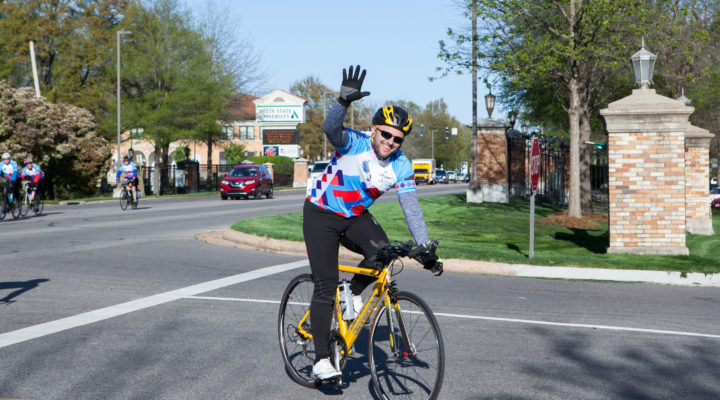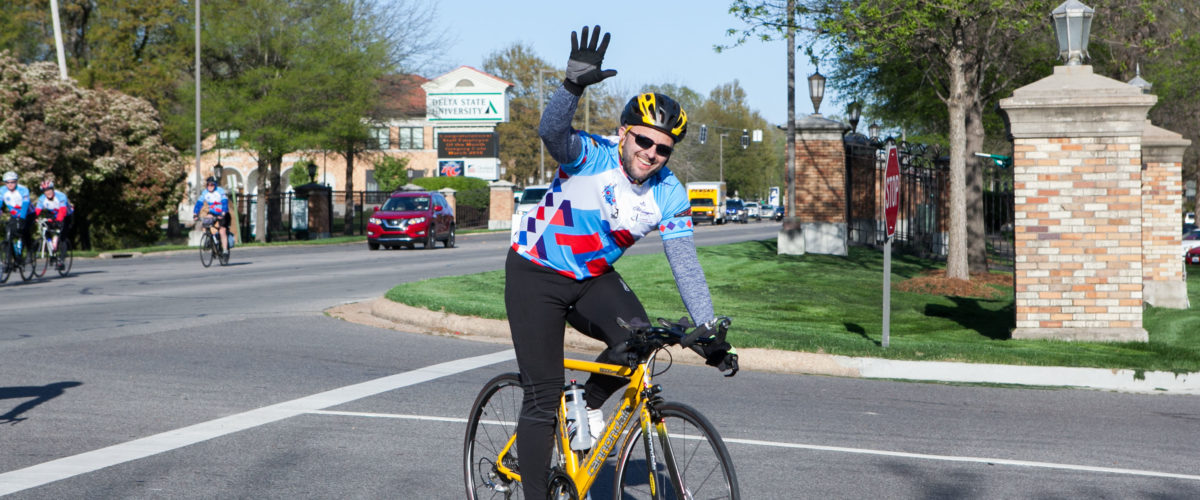Some of the photos on Jason Coker’s Facebook page may give the impression he’s out riding the Tour de France these days.
But the helmet, colorful team jersey and cycling pants he and others are wearing in the April picture tell a much different story – one that fuses fundraising with the urgency of rural poverty, coalition-building and just about the whole of American Civil Rights history.

Jason Coker during Civil Rides Delta. (Photo/Abe Draper)
The project is called Civil Rides, an annual cycling event launched this year to raise awareness of economic and social justice issues and, in the process, raise funds for Together for Hope, the Cooperative Baptist Fellowship’s rural poverty initiative.
“Poverty is at a crisis level, now,” said Coker, the national coordinator for Together for Hope and field coordinator for CBF of Mississippi.
The first ride, called Civil Rides Delta, was a three-day, 270-mile trek to some of the most famous – and infamous– historic sites on the highways between Memphis, Tennessee, and Jackson, Mississippi.
Beginning April 4 – the anniversary of Martin Luther King’s assassination – a dozen riders cycled from the National Civil Rights Museum in Memphis to the Mississippi Civil Rights Museum in Jackson. Another five cyclists pedaled segments of the ride.
The journey was dotted with stops at sites recalling some of most poignant moments and personalities in Civil Rights history, including Emmett Till and activists James Meredith and Fannie Lou Hamer.
Riders also learned about Choctaw history, witnessed the region’s terrible poverty up front and saw sites known for their roles in Delta Blues and other forms of American music.
Altogether, it’s why Coker, who grew up in the Delta, avoids calling the event a “bike ride.”
“It’s an absolute pilgrimage,” he said. “The ground we rode was holy ground. Those places are sacred and sanctified by the blood of the people who died there.”
Powerful experiences
Some of those who rode agreed the ride was much more emotionally and spiritually powerful than other sporting events or fundraisers they had experienced.
“It was really motivating, very sobering and very meaningful to participate in,” said Emily Zilich, 33, of New Orleans.
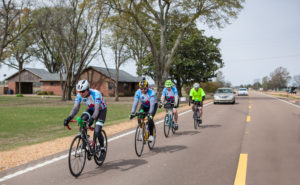
Cyclists cruise during Civil Rides Delta. (Photo/Abe Draper)
Zilich met Coker when he was her youth minister at a Baptist church in Wilton, Connecticut.
And she is no stranger to poverty. Zilich teaches in an urban school with an economically and racially diverse student body. She was first drawn to the city to participate in relief work after Hurricane Katrina.
But seeing first-hand some of the most iconic places in U.S. Civil Rights history, and the open rural poverty, took her inspiration to new levels.
“I had never done anything so fully integrated in bringing mission and purpose and awareness,” she said. “The experience of being at the actual spots where some of these things happened was powerful.”
‘Riding for the people who live there’
With those experiences in mind, more Civil Rides are planned, Coker said.
Next up is Civil Rides Rio Grande Valley in March 2019. Its participants will ride from South Padre Island, Texas, along the Mexican border to witness the ongoing immigration crisis. Stops will include small towns to meet toiling migrant laborers and hear from labor rights activists, according to the event web site.
In subsequent years riders will travel the Cotton Belt, Appalachia and Native Lands out West.
The financial goal was as successful as the educational and experiential, Coker said. The Delta ride raised $25,000 for Together for Hope.
Coalition building is another purpose of the events, Coker said. The idea is to attract individuals and institutions outside the CBF umbrella to cooperate on poverty, Civil Rights and immigration issues.
That happened during the inaugural ride, he said. The working partnership included area colleges and nonprofits and several CBF churches. All added funding to the support CBF provided.
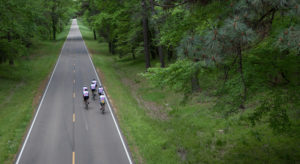
Civil Rides Delta riders make their way to Jackson, Mississippi, in April. (Photo/Abe Draper)
Still others provided bus and van rides, technical help and nourishment along the way, Coker said.
“We had black sororities who volunteered, and local churches,” he said. “The number that came together was crazy.”
Another pickup was Theo Avgerinos, a Hollywood-based filmmaker who was struck by the Civil Rides Delta concept and devoted two film crews to the ride, Coker said.
“He just jumped at it,” Coker said, adding Avgerinos’ is currently finishing a documentary about the ride.
“It helps raise the banner of awareness of poverty in America and in the Delta, which is the poorest region in the whole country,” he said. “We were really riding for the people who live there.”
Unusual sight in rural America
And there was an especially meaningful quality about the cycling itself that contributed to the depth of the experience, CBF Moderator Gary Dollar said.
Dollar is a nationally known nonprofit leader who is no stranger to the social and economic challenges facing millions of Americans.
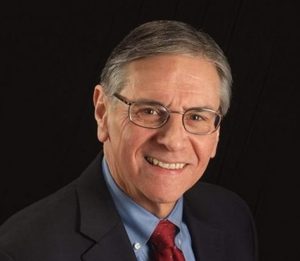
Gary Dollar
“I already knew about rural poverty,” he said.
But pedaling – instead of driving –through the countryside and small towns, stopping periodically for water breaks, presented a much more granular view of rampant scarcity and racism, Dollar said.
“Going along at 15- to 16-mph, you see the impact of poverty,” he said. “You stop at the funeral home where Emmitt Till’s body was prepared, and you talk to people along the Delta and see the impact of racism. It’s very powerful.”
Rand Jenkins, leader of the Texas-based nonprofit Out Hunger, said he was moved by what the ride accomplished.
“My personal experience with Civil Rides proves it to be a pilgrimage,” he said via e-mail.
Along the way, Jenkins said, he learned new names and stories of the Civil Rights struggle and met people who endured unbelievable difficulties.

Rand Jenkins
The experience is a challenge “to further my part in social justice as a mandate of my faith,” he said.
Civil Rides was also transformative to many who live in the Delta, Coker said. It was powerful to those who witnessed the riders passing through their communities. They were often amazed to learn the riders’ cause.
“It’s not something people see in rural America,” he said. “To have 15 to 20 people in the middle of a cotton field is unusual.”
Between the money raised, the relationships established and the history witnessed, Coker added, the event exceeded expectations.
“By the end of the day it delivered in ways we never even imagined.”
Related coverage:
CBF-sponsored ‘Civil Rides’ to highlight plight of rural poor

